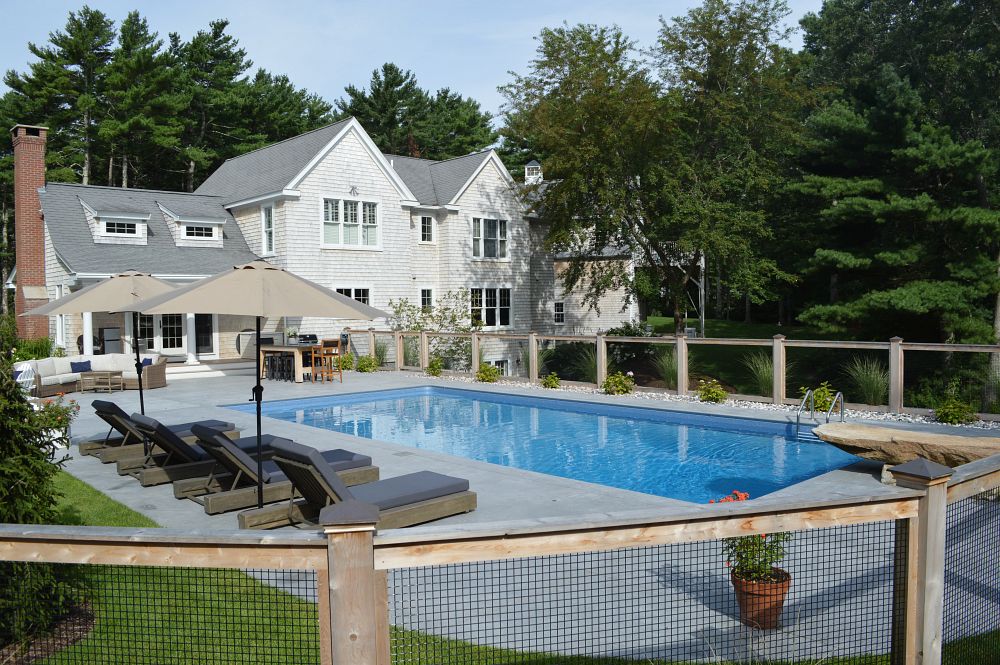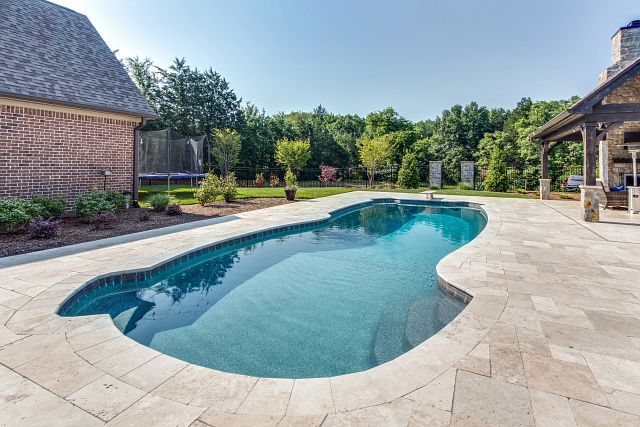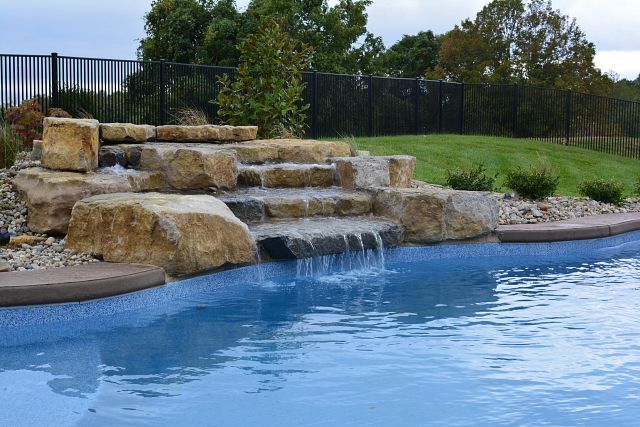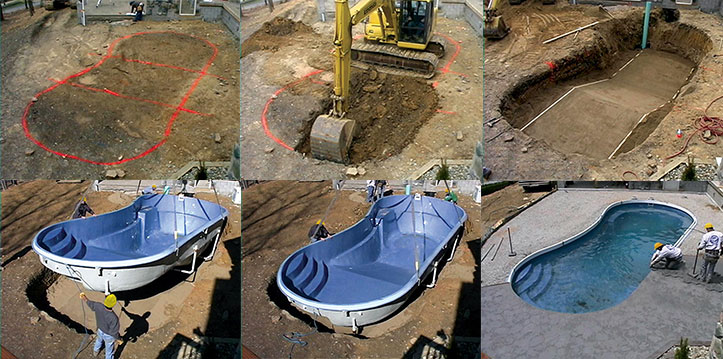Known as “The Evergreen State,” Washington is known for its natural beauty. While Washington’s beaches, mountains, and forests offer ample opportunity to enjoy the great outdoors, there’s nothing quite like enjoying it all from a sparkling pool in the comfort of your backyard.
There’s a pool to fit every lifestyle. Whether you want a quiet backyard sanctuary to come home to after the work-day grind, or a lively spot to host backyard barbecues and get-togethers with friends, the purpose of a pool is to help you live your best life.
Maybe you’re drawn to the sparkle of a fiberglass pool or the customization potential of a vinyl liner pool? In either case, you have plenty of options to choose from. Add-ons and accessories like an automatic pool cover and a winter cover can help protect your pool from falling foliage and heavy winter snow. An automatic pool cover can also be a wise investment that pays for itself over time, helping you save on energy costs and upkeep!
Buying a pool is a big investment – and one that requires a deep dive into understanding the different materials and features that can build a backyard experience you’ll love for years to come. If you’re just wading into the waters of pool research, we’ll cover the differences and benefits of fiberglass and vinyl liner pools, share some beautiful examples of both, offer up tips for pool maintenance in Washington, and also discuss state and local laws around pool ownership.
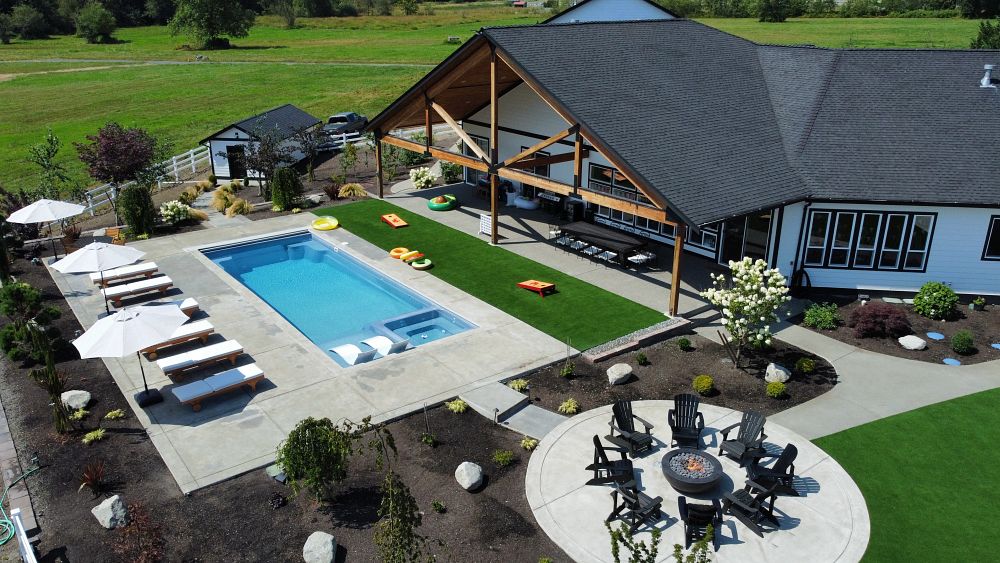
Inground Pool Design Considerations for Washington
Maybe you have an entire Pinterest board full of images of your dream pool. Do you envision yourself in a sleek rectangular fiberglass pool? Or does a softer, rounder classic kidney-shaped pool appeal more to your aesthetic? Or do you imagine family and friends splashing away an afternoon in a gently-curved freeform pool?
While the look of your pool certainly is the stuff dreams are made of, it’s one part of a bigger picture. Pools come in a variety of shapes, sizes, and colors, giving you tons of options to choose from. When building a new pool, it’s even more important to think about how you plan to use your pool. This can help you decide on the size, shape, and how it will fit with the overall vision for your backyard.
Here are a few questions to ask yourself:
- Who’s going to use your pool? Do you have young children or teens? Will they bring friends over to use the pool?
- Do you have older family members or mobility-compromised adults who will use your pool?
- Do you have any pets who might want to hop in the pool? Or may require added safety precautions when they’re in the yard and your pool is not in use?
- When you daydream about a pool, how do you see yourself using it?
- Do you dream of backyard cookouts with a Big Green Egg on the patio, grilling up burgers for family and friends on hot summer weekends?
- Do you plan to squeeze in a morning swim or use your pool for exercise? If you plan to complement a gym routine with pool-based exercise, would a spillover spa do wonders for sore muscles?
- Do you crave quiet times with loved ones and want a backyard sanctuary after a long work day?
- How large is your yard? Do you want to devote significant backyard space to your pool? Or do you also want room for a patio, landscaping or a garden?
When planning your pool, think about how your property layout may impact your pool’s design. From stamped concrete to composite decking, think about the practical features that will surround your pool. What style of fencing will you choose that both offsets the beauty of your pool, privacy, and also meets any state and local requirements for pool ownership? Working with a licensed, professional builder can help you explore more options that are both compliant and fits with your overall vision for your backyard.
Need some inspiration? Check out some of the eye-catching pools Latham has built throughout Washington, shown below. These are just a sampling of what a builder can create for you. For even more options, check with your local builder to see more photos and videos that may not be available online just yet.
Smaller Pools: Perfect for Urban Living and Building a Pool on a Budget
If you live in a densely populated urban area in Washington like Seattle, Spokane, Tacoma or Olympia, you may have a smaller backyard in closer proximity to your neighbors. While you might not be able to accommodate a pool the size of the Puget Sound, don’t sleep on all the fun that a small pool can bring to your backyard!
Even if you have a larger backyard, you may decide that a smaller pool may fit your budget – and lifestyle – better. A smaller pool means less square footage to maintain and more options for the rest of your yard. Whether that involves a lazy hammock suspended between two trees or growing a vibrant vegetable garden, a smaller pool adds a new dimension of fun to your social life and lets you do more with your space.
For instance, the freeform Aruba is ideal for entertaining in a small space. Loaded with swim-up seating, slip-resistant steps and multiple points of entry, this 11’ x 22’ compact pool is the right mix of striking simplicity and cleverly-designed features that make the most of its smaller size.
If you’re thinking of using your pool well into crisp Washington state fall weather, the Axiom 12 Deluxe incorporates a spillover spa into its attractive freeform design, including a wide tanning ledge and plenty of swim-up seating.
If you’re looking for something smaller but equally feature-rich, the Enchantment 9.17 is a rectangular-shaped fiberglass model with a built-in tanning ledge and easy-access steps. It’s also autocover-ready, making it ideal for budget-conscious pool buyers. In many cases, it can be less costly to have a ready-made, rectangular autocover as part of your pool package, as more intricate shapes like a freeform pool may require a custom-cut cover.
Autocovers aren’t just a great investment from a safety perspective – preventing accidents when your pool is not in use – but can help reduce water evaporation and energy usage. During spring and fall when Washington state’s greenery is in full bloom, it can also help minimize maintenance, acting as a barrier against pollen and foliage falling into your pool.
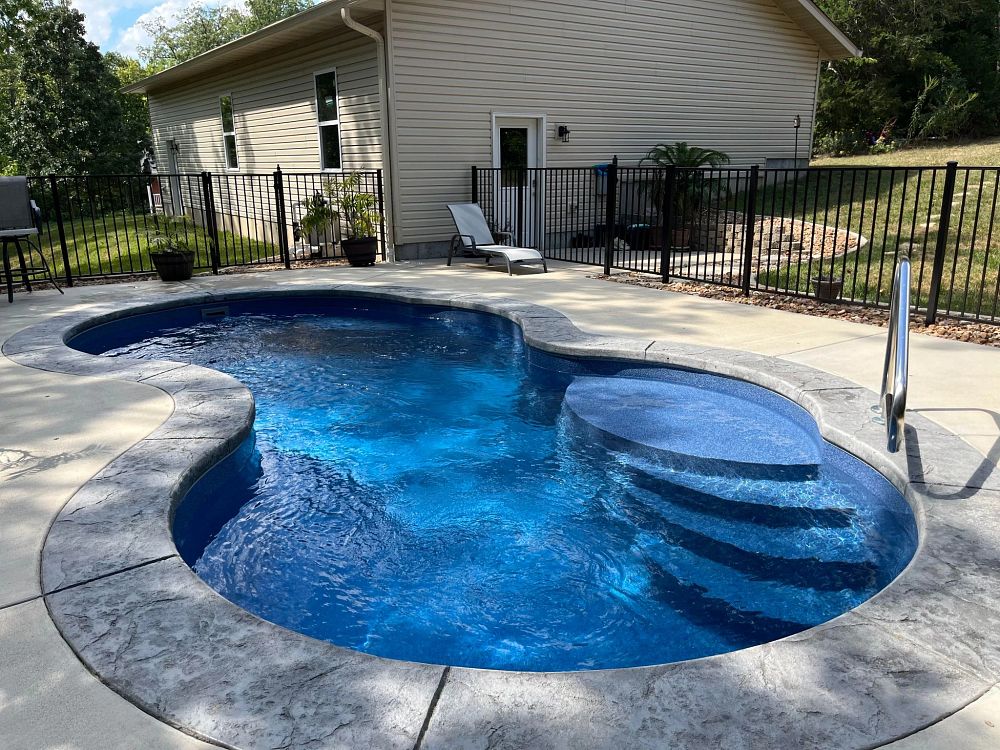
Spacious Pools
If you live in one of the more suburban or less-populated parts of Washington, a bigger pool might be on the menu. Even if you don’t live in Olympia, the 16’ x 35’ Olympia has sleek, rectangular lines and a wide, scalloped top step that doubles as a tanning ledge. Whether you’re swimming laps or entertaining guests, its impressive size and generous swim-up seating give you plenty of room for whatever your heart desires.
If freeform styles speak to you, check out the Synergy, a spacious 16’ x 40’ pool made for enjoying a cold drink – or a coffee, as one does in that state that gave us Starbucks – with your toes in the water or floating the length of your pool.
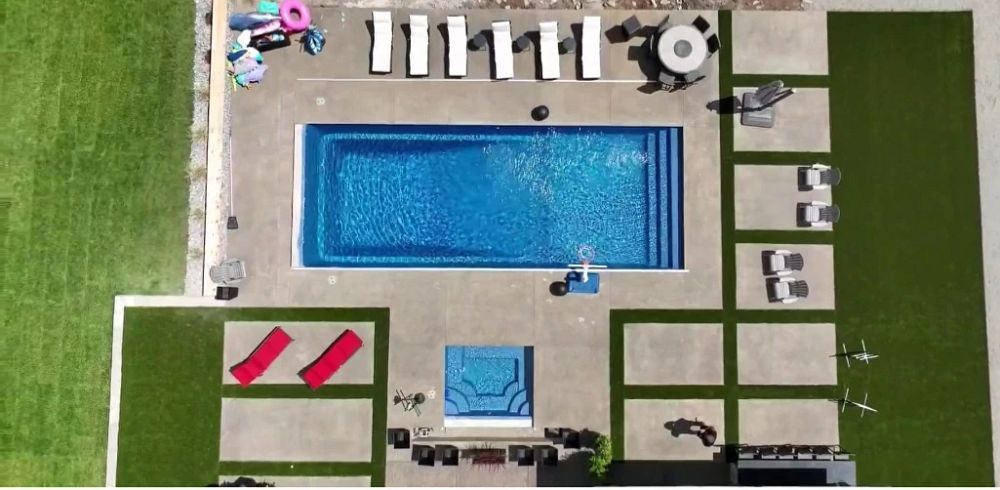
Landscaping Considerations for Washington Pools
From the Hoh Rain Forest in Forks, WA (also home to the Twilight saga) to volcanic mountain ranges in Randle, Washington state is packed with natural beauty. Even outside of its parks and nature trails, residents of The Evergreen State have a bird’s eye view of majestic trees that cover 22.5 million acres. Regardless of where you live in Washington, a pool can be the perfect backyard addition to help you soak in the scenery.
A pool is just one part of your backyard lifestyle. While it’s a “watering hole” for gathering friends and family, it can also be a place to enjoy some well-earned downtime. Enjoy a piping hot mug of coffee from your deck before starting your day. Or take it easy after sundown while enjoying a dip in your spillover spa.
To make your backyard even more of an extension of your home, the right landscaping ideas can offset the beauty of your pool. From clever topiaries to well-appointed flower beds to multi-level decks with hanging planters, there are a number of ways to create a mood for your backyard.
Similarly, add-on water features to your pool can offer a zen-like feel with ambient noise to block out the sounds of traffic. Pool lights and deck lighting can also create a warm, welcoming feel – as well as enhance nighttime visibility.
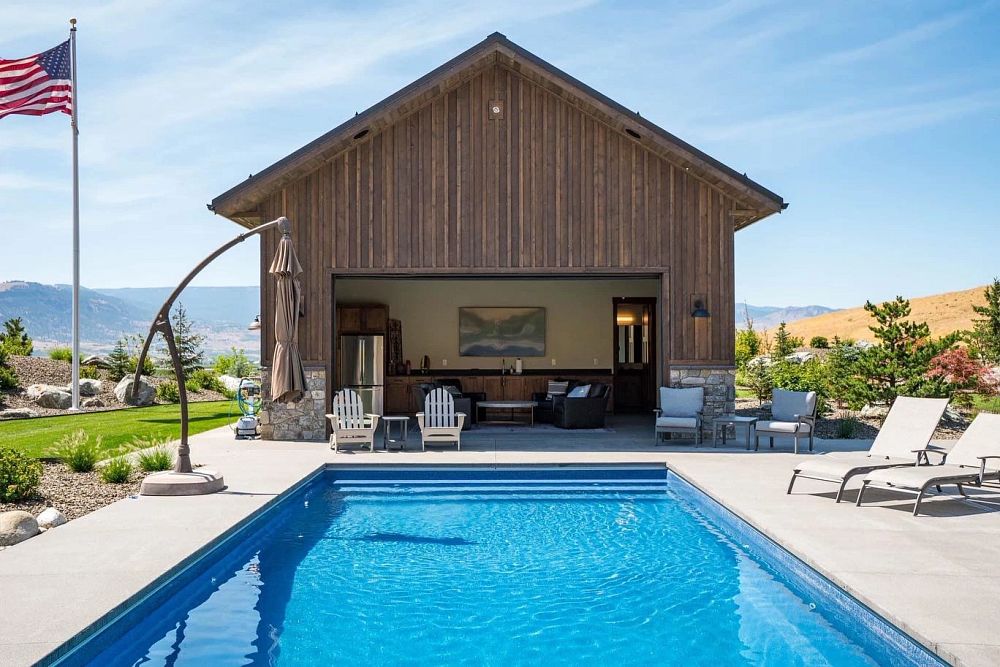
Inground Fiberglass vs. Vinyl Liner Pools: Choosing the Right Material for Your Washington Pool
When buying a pool, investigating the materials your pool is made from can help you enjoy it more. Both fiberglass and vinyl liner pools are known for their durability and ease of maintenance – not to mention overall cost savings through the years.
Although concrete (sometimes called “gunite”) pools had a period of popularity, more modern materials have taken their spot – and with good reason. Concrete pools require a lot more upkeep than fiberglass and vinyl liner pools. Gunite pools require resurfacing at least once per decade due to the fact that they can become rough and chalky with age. Not only does this rough surface contribute to algae clinging to the surface of your pool and wreaking havoc on your water chemistry, but these maintenance costs add up over time. If you live in a coastal region of Washington close to the Pacific, salt air can be particularly tough on an older concrete pool – as can some of the state’s harsh winter weather – causing it to degrade more rapidly.
Compare fiberglass, vinyl liner and concrete pools to find the right pool material for you!
Fiberglass Pool Benefits
Fiberglass pools are one of the most popular materials for pools today – and with good reason. Their eye-catching colors and crystalline finishes dazzle the eye and make taking a swim a feast for the senses. This smooth surface is more than just a pretty face: it makes your pool less susceptible to algae development and even easier to clean.
A fiberglass pool is a low-maintenance option that requires less upkeep than other materials. And if you’re shopping for a pool, a fiberglass pool can often be a faster option to install. Because carefully engineered, high-quality fiberglass pool shells are manufactured off-site and transported to your backyard, this saves time on installation, allowing you to enjoy your new pool sooner.
If you’re shopping for a pool, your mind may be swimming with questions. Not just around pool season maintenance, but how Washington weather may impact your pool over time: “”Do fiberglass pools crack in cold weather?” “Is it OK for a fiberglass pool to freeze?” Fortunately, fiberglass holds up equally well in hot and cold weather. Fiberglass expands and contracts less than other pool materials, enhancing its longevity and durability.
Learn more about the benefits of owning a fiberglass pool.
Vinyl Liner Pool Benefits
Vinyl liner pools also have their share of benefits. Virtually limitless potential for customization and a cost-effective nature top this list. Although vinyl liner pools require slightly more maintenance than fiberglass pools, that extra elbow grease pays off with long-term savings.
Vinyl liner pools allow you to customize everything from shape and size to liner colors and patterns. Custom add-ons can allow you to tailor your pool to suit your lifestyle. For the entertainer, tanning ledges and LED pool lights create the right atmosphere for hosting. For families with kids who want a backyard water park, slides and bubblers can be a great fit.
If you have an uneven backyard, vinyl liner pools can be an excellent option. Because they are poured into place, your licensed pool builder can grade your land or add a retaining wall to accommodate a new pool.
Vinyl liner pools are also a great fit that can change with you and your family over time. You can add or subtract features to suit changing lifestyles and tastes. For instance, when the kids outgrow water slides, you can replace them with a spillover spa or tanning ledge to accommodate more of their friends – or your own!
When planning any upgrades, do your homework ahead of time and schedule removal or addition of features to coincide with replacing your vinyl liner. A well-maintained vinyl liner can last for nearly 10 years before it has to be replaced – a far less costly proposition than resurfacing a concrete pool!
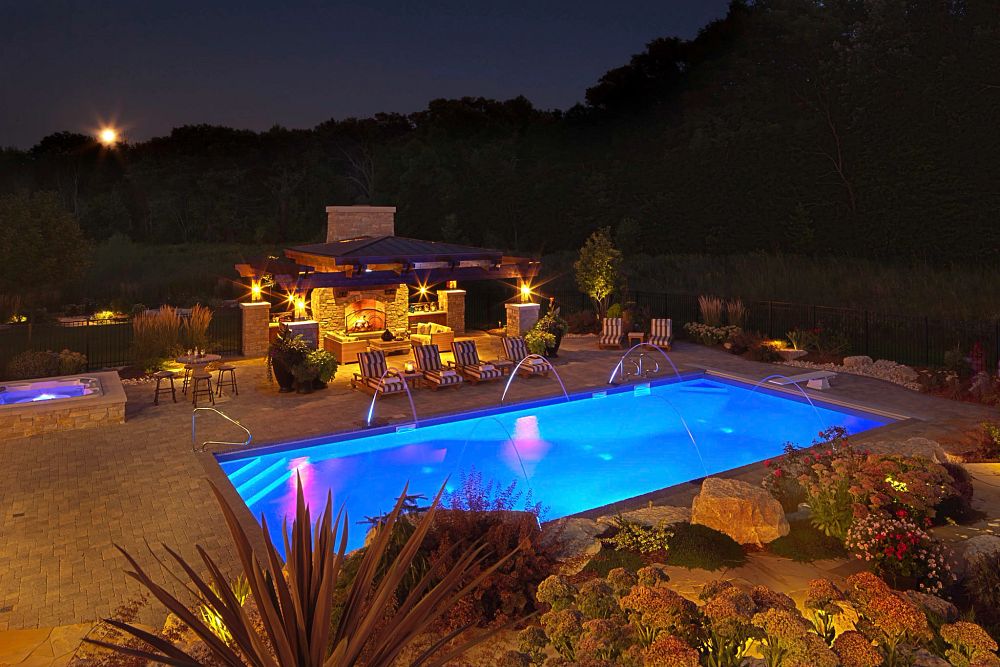
Inground Pool Maintenance for Washington Pools
Washington may have given birth to the “Seattle Sound,” but grunge is not something you want in your pool. Thankfully, both fiberglass and vinyl liner pools are easy to maintain, requiring minimal upkeep. Depending on the type of material you choose for your new pool, you may have a slightly different task list to keep your pool looking and running its best.
Maintaining Your Fiberglass Pool in Washington
Fiberglass pools are gorgeous. And they don’t require a lot of maintenance to stay that way. Set aside weekly time to give your pool a good skimming, check your chemistry and empty filter baskets.
Learn more about fiberglass pool maintenance.
Vinyl Liner Pool Maintenance in Washington
If you own a vinyl liner pool, you can anticipate doing a little more weekly upkeep than you would with a fiberglass pool. However, the extra effort pays off in overall cost savings.
Once per week, skim your pool and test/rebalance your water chemistry. You’ll also want to gently scrub your liner weekly to keep it looking fresh, as well as discourage stains and algae.
Once each month, check your liner for any tiny holes and patch them before they grow larger. This can help give your liner a longer lease on life. Remember: a liner that’s well cared-for can last for 10 years or more!
You can also prolong the lifetime of your liner by using only soft pool toys. So, stock up on foam pool noodles, inflatable animal floats and beach balls to encourage poolside fun that’s kinder to your liner!
Learn more about vinyl liner maintenance with our helpful checklist.
Pool Covers
An automatic pool cover is a worthwhile investment for pool owners in The Evergreen State. Ranking #1 in terms of rainfall out of all 50 states, Washington’s penchant for precipitation, can play a role in throwing off the balance of your pool’s water chemistry.
An autocover can help protect your pool’s water, as well as maintain more constant water temperatures. Overall, an autocover can help you save between 50% to 70% on energy costs and reduce water evaporation and chemical usage to maintain your pool. This means less time taking care of your pool and more time enjoying it!
Even more importantly, autocovers can save lives, preventing kids and pets from accidentally falling in when unattended. With just the touch of a button, an autocover closes your pool off and serves as an additional layer of safety. An autocover can also be an extra barrier that prevents others from hopping the fence and helping themselves to your pool without your knowledge.
Additionally, given Washington’s lush greenery that covers more than half the state, an autocover can minimize the amount of pollen and foliage that lands in your pool during spring and fall. Given that both can contribute to the development of algae, this is just one more way that an autocover can enhance the enjoyment of your pool.
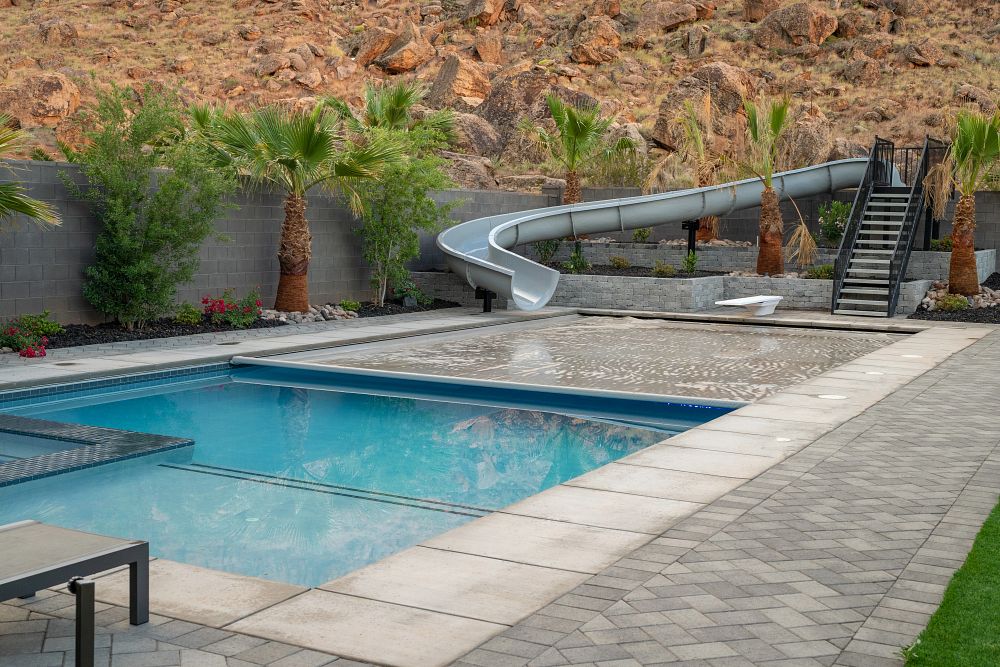
Winter Maintenance
Although an autocover can enhance the safety of your pool and make maintenance easier, a winter cover can protect your pool and the delicate components of an autocover from the weight of heavy snow after closing your pool for the season.
You’ll also want to be aware of best practices to close your pool yourself before a Washington winter sets in – or schedule a licensed contractor to assist you with properly winterizing your pool to make for a smooth reopening come spring.
Learn more about how to winterize your pool.
Cost of an Inground Pool in Washington State
If you’re planning to install a new pool in Washington, the cost can vary based on a variety of factors. Everything from the material your pool is made from, size, and add-ons can play a role in the total cost of your pool. Any underlying features of your backyard – such as clay soil, uneven or rocky terrain – that may require some extra handling to properly accommodate your pool can also add to the total cost of your pool.
The area and items surrounding your pool should also be factored into the total cost. Safety features like fencing and autocovers, as well as landscaping and decking to enhance the look of your pool all figure into the up-front cost of your pool.
How to Make the Most of a Pool in Washington
Even though Washington has its fair share of rain and crisp weather, it’s still a great place to enjoy a pool. Thoughtful planning can help you make the most of your pool.
- Install a heater. Adding a heating element to your pool can make the water warm and welcoming any time you want to soak your cares away.
- Choose the right type of pool. A smaller pool may be easier to heat and maintain. Similarly, a model with a built-in spillover spa can give you a cozy corner of your pool when temperatures take a tumble.
- Invest in an autocover. An autocover can be an effective barrier against rainfall, which can compromise water chemistry. Similarly, an autocover can also reduce water evaporation and maintain more even water temperature – especially if your pool is heated.
- Install a fire pit. Thinking about all of the elements surrounding your pool also contributes to the bigger picture. Adding a fire pit to your patio can give you a place to warm up, toast some s’mores – and raise a toast to friends – poolside.
Washington Pool FAQs
Owning a pool is a lot of fun. But it also comes with its fair share of responsibility in keeping everyone who uses it safe. Washington has several laws that apply throughout the state, as well as local regulations that may be more stringent. It’s important to take stock of these laws to ensure your pool is compliant. Working with a professional builder can help you better understand the most recent pool laws in Washington, as well as your responsibilities as a pool owner.
Here are some of the most common questions prospective Washington pool owners have around state and local regulations.
Do you have to have a fence around a pool in Washington state?
Yes. The Washington state Department of Health mandates that a pool must be surrounded by fencing at least 4 feet (48 inches) high with self-closing, self-latching gates. If an exterior wall of the home serves as part of a pool barrier, any doors or windows leading to the pool area must be equipped with a compliant alarm system.
Washington State also gives pool owners the option of an automatic safety pool cover to use as a barrier. All safety covers must meet rigid state standards in order to negate the need for a fence that meets Washington state regulations.
Although these pool fencing requirements apply state-wide, individual cities and counties have even stricter laws around pool fencing. For example, Wenatchee, WA requires that all inground pools be surrounded by a 5-foot tall fence, although neighboring East Wenatchee only requires a fence that is 4 feet high.
Because laws change over time and your city or town may have their own unique requirements, it’s important for Washingtonians to check with their local building office to be sure pool fencing meets all applicable safety standards.
Do you need a permit to build an inground pool in Washington state?
Although there is no statewide mandate for a permit to build a residential inground pool in Washington, different townships, counties, and cities require you to have a permit before breaking ground on a new swimming pool – or if you plan to make any renovations to an existing pool.
For instance, Olympia, WA does not require a permit for an above-ground swimming pool, but will require a permit for an inground swimming pool more than 3 feet deep or capable of holding more than 5,000 gallons of water. Additionally, work associated with installing an inground pool – such as plumbing, excavation, or yard sprinkler systems would require permits.
King County – home to Washington’s largest city, Seattle – also requires a permit for inground swimming pools deeper than 3 feet and that hold more than 5,000 gallons of water. In addition, homeowners may require a Public Health permit if the pool will sit on a property with an on-site sewage system. Seattle also requires additional permits for pool accessories, such as decking and sheds.
Yakima, WA also requires several different permits, bundled together in a packet, that must be completed before breaking ground on a new residential pool. These permits include a swimming pool permit, plumbing permit and mechanical permit, which should also be accompanied by a detailed site plan checklist. Not included in this packet are electrical permits, which must be issued by Washington State Labor & Industries.
Because state and local laws can change over time and differ across municipalities, be sure to check with your local building office to ensure you have the proper permits for your pool to be compliant. Working with a local builder can help you get a better handle on what permits you’re responsible for obtaining, as well as be well-versed in the latest laws.
Washington Inground Pool Installation Areas
Latham has helped countless residents throughout Washington build the pool of their dreams, including those in:
- Bellingham, WA
- Burlington, WA
- Everett, WA
- Gig Harbor, WA
- Kennewick, WA
- Mead, WA
- Milton, WA
- Newman Lake, WA
- Renton, WA
- Richland, WA
- Seattle, WA
- Spokane, WA
- Spokane Valley, WA
- Tacoma, WA
- Walla Walla, WA
- Wenatchee, WA
- Woodinville, WA
- Yakima, WA
Start Building a Pool for Your Washington Backyard Today
With nearly 60 years in the pool industry and a reputation for innovation and customization, Latham is here to help you find the right pool to fit both your backyard and your lifestyle. Speak to an independent builder today to start making your pool dreams a reality.
Got questions? Contact Latham today!

